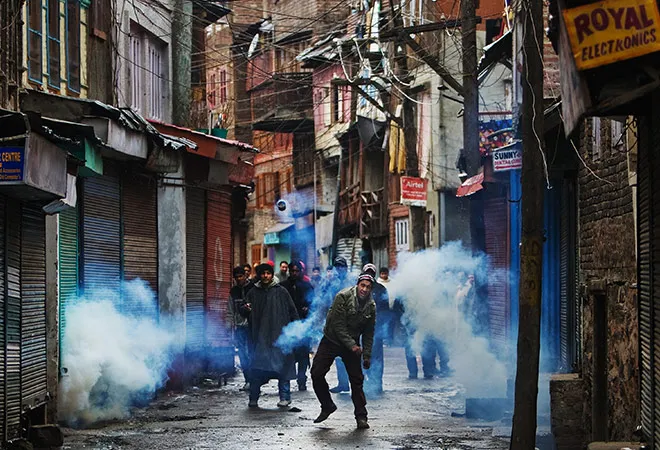
On 6 August 2019, a day after the announcement of the bifurcation of Jammu &Kashmir (J&K) and de-operationalisation of Article 370, Farooq Abdullah managed to sneak out of his home detention to speak with a couple of television news crews. During the hastily carried out interview, Abdullah broke down into tears; his first reaction was: “I came to tell you what we feel inside. That, for 70 years, we fought battles with the nation and today we are supposed to be the culprits.” During the short interview, he said, “I may die because of my health but I want to leave a message to the people of India: We have been with India through thick and thin and we hope the people of India stand with us.”
Farooq Abdullah, his party colleagues, and other political leaders were kept under detention—some of them under the Public Safety Act—for many months. The detentions of some leaders continued for over a year. All this while, the BJP, other national parties, their allies, and the media kept deriding and denigrating the political leaders of Kashmir, particularly former chief ministers and “three political dynasties” for all the ills and evils that existed in the region. Very often, these leaders were labelled as “anti-national”, responsible for fostering separatism and terrorism in the erstwhile state. Some fringe elements in the media and political sphere even categorised them as “jihadis”. The message was clear—the time of old political elites was over and that there was an intent to create a new political leadership in J&K for attaining the goal of ‘Naya Kashmir’.
Serious business
Twenty-two months after the sweeping constitutional changes were brought in, the tables appear to have turned. The very political leaders who were branded as culprits for all the miseries of J&K are now part of the process to possibly discuss the way forward for the union territory. The reasons for this monumental shift in New Delhi’s policy are many and given the opaque nature of the political dispensation, it will never be clear as what to led to this policy shift. Notwithstanding that, the Prime Minister has generated a tremendous buzz by calling former leaders of J&K for an all party meet.
The very political leaders who were branded as culprits for all the miseries of J&K are now part of the process to possibly discuss the way forward for the union territory. The reasons for this monumental shift in New Delhi’s policy are many and given the opaque nature of the political dispensation, it will never be clear as what to led to this policy shift
The seriousness of the gesture is signalled by the fact that the Prime Minister himself is conducting the meeting. Instead of inviting the leaders one-on-one and tying them in knots of confusion, the government has decided to hold a joint round table meeting with all former Chief Ministers (CM), Deputy CMs, and heads of all major parties of J&K. The list of invitees suggests that the Prime Minister means business. A meeting with a huge list of participants would have most likely ended up in chaos and logjam. Enough groundwork has been done through backchannels and intermediaries to ensure the participants see this initiative as the beginning of a meaningful political process.
Although the agenda of the meeting has not been made public,
news reports suggest that the government is intending to restore full statehood to J&K after the delimitation process is completed followed by elections. The Prime Minister is expected to reveal a blueprint for kicking off the political process in J&K and set the ball rolling for assembly elections. A close look at the demographic make up of J&K reveals that the much-touted delimitation process may end in a damp squib. The desire to alter the power imbalance between the Kashmir and Jammu region may not fructify as per the wishes of its core vote base; the new political parties that were set up post the bifurcation of the state have failed to achieve any significant results and, thus, there appears to be no option but to work with other political parties to take the political process forward.
From Gupkar gang to all-party
Ahead of the District Development Council (DDC) elections in November 2019, the valley-based politicians came together in the form of an anti-BJP alliance of like-minded political parties demanding the restoration of the special status of J&K. This alliance as labelled the “Gupkar Gang”, which was expected to either
“swim along with the national mood or else the people will sink it.”
The results of the DDC elections made it clear that the parties constituting the Gupkar alliance are as electorally relevant as the BJP and its allies in the region.
The results of the DDC elections made it clear that the parties constituting the Gupkar alliance are as electorally relevant as the BJP and its allies in the region. The National Conference emerged as a front runner in the Valley and managed to win many seats in Muslim-dominated areas of Jammu. Likewise, despite a blitzkrieg campaign to discredit the alliance, the people reposed faith in Mehbooba Mufti’s Peoples Democratic Party (PDP) and Sajad Lone’s Peoples’ Conference and other smaller parties over the newly formed Apni Party, which had been set up in early 2020. It became clear that any political process would be meaningless without taking these parties on board.
Naya Kashmir, old rulers
Curiously, the meeting will not see any participation from Panchs, Sarpanchs, block development councils (BDCs) and DDCs or the associations representing them. Similarly, none of the newly formed political parties, except the Apni Party, have been invited. It seems that the political upstarts who rose to fame immediately after August 5
th, 2019 have been ousted.
In return, these political novices
became self-styled architects of Naya Kashmir. They were
paraded on national TV and corridors of power as
replacements for the Abdullahs and Muftis. As it is, there is no dearth of conflict entrepreneurs in Kashmir but their failure to even gather a few hundred people in support of their cause has upset plans to bring a new normalcy to J&K.
The slogan of Naya Kashmir was originally coined by Sheikh Abdullah after J&K acceded to India in the form of a progressive vision document that promised equitable governance and rights to the people of the region. Since then, this slogan has been appropriated by various parties
The slogan of Naya Kashmir was originally coined by Sheikh Abdullah after J&K acceded to India in the form of a progressive vision document that promised equitable governance and rights to the people of the region. Since then, this slogan has been appropriated by various parties. While the historians are still debating the legacy of Sheikh Abdullah, it is quite evident that the burden of the new Naya Kashmir vision will fall on the shoulders of the same old leaders who were not long ago seen as outcasts and culprits.
Buzz on ground
Propaganda appears chic when presented in the form of brochures printed on executive paper accompanied by high-resolution pictures. The ground reality is more often than not overshadowed by a cacophony of prime-time debates. And when a top bureaucrat of the government shows
reluctance to demit office, it’s a worrying signal for democracy and for the people who are governed by such self-serving individuals. Needless to say, the centre’s initiative for a political process in J&K has created a huge buzz. The common people, voters and boycotters, fence-sitters ,and naysayers all see the political process as an imperative to move forward from the impasse brought in by monumental changes of 5 August 2019. But for the political leaders, particularly the valley-based ones, things are more sensitive than they have ever been. These parties are facing a formidable rival that has the power to coerce and persuade the Opposition to fall in line. On the other, winning back the trust of the people will be conditional on their negotiations with the central government and its policies. In days to come, New Delhi’s policy towards Jammu & Kashmir may take a slightly softer approach to accommodate various shades of political opinion but it is quite evident that there will be no flexibility on the abrogation of Article 370 and the special status of J&K. The initiation of political process has set J&K into a transition phase and the future of the region will depend on whether New Delhi’s policy relies on hard-line ideological position or a more pragmatic approach.
The views expressed above belong to the author(s). ORF research and analyses now available on Telegram! Click here to access our curated content — blogs, longforms and interviews.



 On 6 August 2019, a day after the announcement of the bifurcation of Jammu &Kashmir (J&K) and de-operationalisation of Article 370, Farooq Abdullah managed to sneak out of his home detention to speak with a couple of television news crews. During the hastily carried out interview, Abdullah broke down into tears; his first reaction was: “I came to tell you what we feel inside. That, for 70 years, we fought battles with the nation and today we are supposed to be the culprits.” During the short interview, he said, “I may die because of my health but I want to leave a message to the people of India: We have been with India through thick and thin and we hope the people of India stand with us.”
Farooq Abdullah, his party colleagues, and other political leaders were kept under detention—some of them under the Public Safety Act—for many months. The detentions of some leaders continued for over a year. All this while, the BJP, other national parties, their allies, and the media kept deriding and denigrating the political leaders of Kashmir, particularly former chief ministers and “three political dynasties” for all the ills and evils that existed in the region. Very often, these leaders were labelled as “anti-national”, responsible for fostering separatism and terrorism in the erstwhile state. Some fringe elements in the media and political sphere even categorised them as “jihadis”. The message was clear—the time of old political elites was over and that there was an intent to create a new political leadership in J&K for attaining the goal of ‘Naya Kashmir’.
On 6 August 2019, a day after the announcement of the bifurcation of Jammu &Kashmir (J&K) and de-operationalisation of Article 370, Farooq Abdullah managed to sneak out of his home detention to speak with a couple of television news crews. During the hastily carried out interview, Abdullah broke down into tears; his first reaction was: “I came to tell you what we feel inside. That, for 70 years, we fought battles with the nation and today we are supposed to be the culprits.” During the short interview, he said, “I may die because of my health but I want to leave a message to the people of India: We have been with India through thick and thin and we hope the people of India stand with us.”
Farooq Abdullah, his party colleagues, and other political leaders were kept under detention—some of them under the Public Safety Act—for many months. The detentions of some leaders continued for over a year. All this while, the BJP, other national parties, their allies, and the media kept deriding and denigrating the political leaders of Kashmir, particularly former chief ministers and “three political dynasties” for all the ills and evils that existed in the region. Very often, these leaders were labelled as “anti-national”, responsible for fostering separatism and terrorism in the erstwhile state. Some fringe elements in the media and political sphere even categorised them as “jihadis”. The message was clear—the time of old political elites was over and that there was an intent to create a new political leadership in J&K for attaining the goal of ‘Naya Kashmir’.
 PREV
PREV


